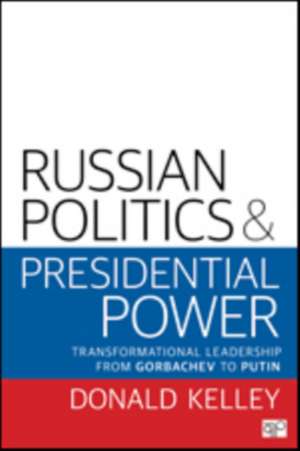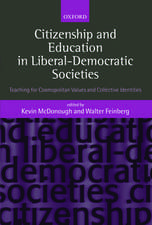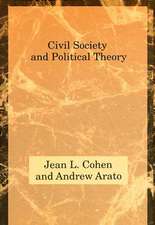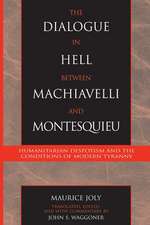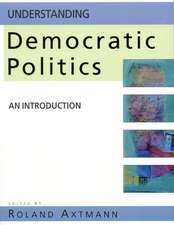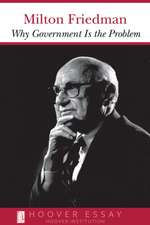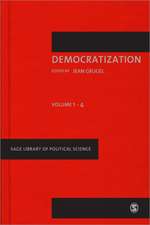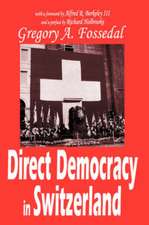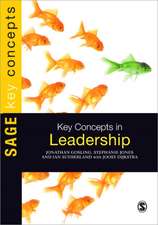Russian Politics and Presidential Power: Transformational Leadership from Gorbachev to Putin
Autor Donald R. Kelleyen Limba Engleză Paperback – 20 dec 2016
Preț: 392.40 lei
Preț vechi: 503.08 lei
-22% Nou
Puncte Express: 589
Preț estimativ în valută:
75.11€ • 78.91$ • 63.12£
75.11€ • 78.91$ • 63.12£
Carte tipărită la comandă
Livrare economică 12-26 martie
Preluare comenzi: 021 569.72.76
Specificații
ISBN-13: 9780872894044
ISBN-10: 0872894045
Pagini: 312
Dimensiuni: 152 x 229 x 15 mm
Greutate: 0.38 kg
Ediția:1
Editura: SAGE Publications
Colecția CQ Press
Locul publicării:Washington DC, United States
ISBN-10: 0872894045
Pagini: 312
Dimensiuni: 152 x 229 x 15 mm
Greutate: 0.38 kg
Ediția:1
Editura: SAGE Publications
Colecția CQ Press
Locul publicării:Washington DC, United States
Recenzii
“Russian Politics and Presidential Power provides excellent insight into the Russian national character and the intellectual and emotional challenges that motivate people. The narrative is well written, , profound, and honest. The book is a very good resource for students who want to learn more about the nature of Russian politics.”
“Donald Kelley’s concept of 'modern authoritarians' as a central theme enables a reader to follow the complex personalities and course of events. Perhaps even more valuable is the accuracy of the concept in portraying the Russian political experience. It is clear and presents the material that students need to understand.”
“Russian Politics and Presidential Power is a fine text for undergraduate audiences and a good one for graduate students to review, too. The notion of the 'authoritarian modernizer' helps as a way to understand the Russian presidency and to get away from the tendentious arguments about Yeltsin and Putin that are so often indulged in. Kelley’s work is clearly written with well explained examinations of the turbulent eras covered.”
“Russian Politics and Presidential Power is notable for Professor Kelley’s attention to political 'legacies' of past Russian and Soviet chief executive offices and practices. Dr. Kelley demonstrates a number of the reasons for which Russian Federation politics have remained very fluid, and he acquaints the reader with many of the major political issues that have surfaced within the Russian political arena since before the disappearance of the Union of Soviet Socialist Republics.”
“Donald Kelley’s concept of 'modern authoritarians' as a central theme enables a reader to follow the complex personalities and course of events. Perhaps even more valuable is the accuracy of the concept in portraying the Russian political experience. It is clear and presents the material that students need to understand.”
“Russian Politics and Presidential Power is a fine text for undergraduate audiences and a good one for graduate students to review, too. The notion of the 'authoritarian modernizer' helps as a way to understand the Russian presidency and to get away from the tendentious arguments about Yeltsin and Putin that are so often indulged in. Kelley’s work is clearly written with well explained examinations of the turbulent eras covered.”
“Russian Politics and Presidential Power is notable for Professor Kelley’s attention to political 'legacies' of past Russian and Soviet chief executive offices and practices. Dr. Kelley demonstrates a number of the reasons for which Russian Federation politics have remained very fluid, and he acquaints the reader with many of the major political issues that have surfaced within the Russian political arena since before the disappearance of the Union of Soviet Socialist Republics.”
Cuprins
Preface
Acknowledgments
About the Author
Chapter 1: Executive Power in Russian Politics
What Does Executive Leadership Mean in the Russian Context?
Authoritarian Modernizers: The Prototype
Characteristics of Authoritarian Modernizers
What Can We Learn from Past “Executives”?
Earlier Authoritarian Modernizers
The Brezhnev Era: The Long Calm before the Storm
The Uncertain Interregnum: Andropov and Chernenko
Chapter 2: The Gorbachev Presidency
The Starting Point: What Gorbachev Intended
Gorbachev’s Rise to Power
From General Secretary to President
The Reform Agenda: Politics and Policy
Glasnost
The Economy: Perestroika
Judicial Reform
Foreign Policy
Political Reform: Democratization
Democratization of the Communist Party
The Gorbachev Presidency
The Presidency of the Russian Federation
The Battle of the Presidents
Gorbachev as an Authoritarian Modernizer
Chapter 3: The Yeltsin Presidency, 1991–1993
Yeltsin’s Path to Moscow
From Outcast to President
The President Becomes a President
A Real President Gets a Real Nation
Personal Rivalries
Economic Reforms as a Political Issue
Yeltsin’s Economic Reforms: Phase I (1991–1993)
The Reform of the Party-State
National Identity and the Union Treaty
Judicial Reform
The President and the Legislature
Foreign Policy
Yeltsin as an Authoritarian Modernizer: A Preliminary Assessment
Chapter 4: Yeltsin and Russia Reborn
The Presidency and the Legislature
Judicial Reform
The 1993 Duma Elections
The 1995 Duma Elections
The 1996 Presidential Election
The Second Term: From Victory to Resignation
Yeltsin’s Economic Reforms: Phase II (1994-1999)
Foreign Policy
The First Chechen War
The December 1999 Duma Elections
Yeltsin’s Surprise Resignation
Yeltsin as an Authoritarian Modernizer: A Final Assessment
Chapter 5: Putin I, 2000–2008
The 2000 Presidential Election
Vladimir Putin: From Spy Novels to the Kremlin
The Putin Formula
The Putin Presidency Emerges from Yeltsin’s Shadow
Outside the Garden Ring: “Managing” the New Democracy
The Presidency and the Legislature: The 2003 Duma Elections
Judicial Reform
The 2004 Presidential Election
The Rules and the Game Change
The Run-Up to the 2008 Presidential Election
The 2007 Duma Elections
Putin’s Economic Reforms
Foreign Policy
The Second Chechen War
The 2008 Presidential Election
Putin as an Authoritarian Modernizer
Chapter 6: The “Tandem”
Dmitry Medvedev: Putin’s Friend from Leningrad
Governing the Nation in Tandem
Medvedev and Putin in Tandem
Factional Realities
Medvedev and Economic Reform
Medvedev and Political Modernization
Judicial Reform
Foreign Policy
The Russian-Georgian War
Medvedev and the Legislature: The 2011 Duma Elections
The Duma Election and Voting Fraud
The 2012 Presidential Election
Election Results
Medvedev as an Authoritarian Modernizer
Chapter 7: Putin II, 2012–
The “New” Cabinet
Putin II: Old and New Realities
Maintaining the Balance within the Garden Ring
Controlling the Opposition
The Economy: Prosperity and Modernity
Foreign Policy
Crimea and Ukraine
Russian Foreign Policy and the World
The Three Arenas of Russian Politics
Inside the Garden Ring: Factional Politics in Putin II
A Note on the Siloviki
Outside the Garden Ring: Politics in the Rest of the Russian Federation
The Authoritarian Modernizer Revisited
The Legal System and the Courts
Connecting Those Inside and Outside the Garden Ring
Political Parties
Civil Society
Control of the Media
The Leadership Cult as a Connection
Putin as an Authoritarian Modernizer
Chapter 8: The Future(s) of Russian Politics
The Future of the Russian Presidency(ies)
What Will Drive Change?
Changes in the Nature of Factional Politics
Changes in the Nature of Electoral Politics at the National, Regional, and Local Levels
Politics Moves to the Street: A Color Revolution or Moscow Spring
What Is a Color Revolution?
A Russian Color Revolution?
Index
Acknowledgments
About the Author
Chapter 1: Executive Power in Russian Politics
What Does Executive Leadership Mean in the Russian Context?
Authoritarian Modernizers: The Prototype
Characteristics of Authoritarian Modernizers
What Can We Learn from Past “Executives”?
Earlier Authoritarian Modernizers
The Brezhnev Era: The Long Calm before the Storm
The Uncertain Interregnum: Andropov and Chernenko
Chapter 2: The Gorbachev Presidency
The Starting Point: What Gorbachev Intended
Gorbachev’s Rise to Power
From General Secretary to President
The Reform Agenda: Politics and Policy
Glasnost
The Economy: Perestroika
Judicial Reform
Foreign Policy
Political Reform: Democratization
Democratization of the Communist Party
The Gorbachev Presidency
The Presidency of the Russian Federation
The Battle of the Presidents
Gorbachev as an Authoritarian Modernizer
Chapter 3: The Yeltsin Presidency, 1991–1993
Yeltsin’s Path to Moscow
From Outcast to President
The President Becomes a President
A Real President Gets a Real Nation
Personal Rivalries
Economic Reforms as a Political Issue
Yeltsin’s Economic Reforms: Phase I (1991–1993)
The Reform of the Party-State
National Identity and the Union Treaty
Judicial Reform
The President and the Legislature
Foreign Policy
Yeltsin as an Authoritarian Modernizer: A Preliminary Assessment
Chapter 4: Yeltsin and Russia Reborn
The Presidency and the Legislature
Judicial Reform
The 1993 Duma Elections
The 1995 Duma Elections
The 1996 Presidential Election
The Second Term: From Victory to Resignation
Yeltsin’s Economic Reforms: Phase II (1994-1999)
Foreign Policy
The First Chechen War
The December 1999 Duma Elections
Yeltsin’s Surprise Resignation
Yeltsin as an Authoritarian Modernizer: A Final Assessment
Chapter 5: Putin I, 2000–2008
The 2000 Presidential Election
Vladimir Putin: From Spy Novels to the Kremlin
The Putin Formula
The Putin Presidency Emerges from Yeltsin’s Shadow
Outside the Garden Ring: “Managing” the New Democracy
The Presidency and the Legislature: The 2003 Duma Elections
Judicial Reform
The 2004 Presidential Election
The Rules and the Game Change
The Run-Up to the 2008 Presidential Election
The 2007 Duma Elections
Putin’s Economic Reforms
Foreign Policy
The Second Chechen War
The 2008 Presidential Election
Putin as an Authoritarian Modernizer
Chapter 6: The “Tandem”
Dmitry Medvedev: Putin’s Friend from Leningrad
Governing the Nation in Tandem
Medvedev and Putin in Tandem
Factional Realities
Medvedev and Economic Reform
Medvedev and Political Modernization
Judicial Reform
Foreign Policy
The Russian-Georgian War
Medvedev and the Legislature: The 2011 Duma Elections
The Duma Election and Voting Fraud
The 2012 Presidential Election
Election Results
Medvedev as an Authoritarian Modernizer
Chapter 7: Putin II, 2012–
The “New” Cabinet
Putin II: Old and New Realities
Maintaining the Balance within the Garden Ring
Controlling the Opposition
The Economy: Prosperity and Modernity
Foreign Policy
Crimea and Ukraine
Russian Foreign Policy and the World
The Three Arenas of Russian Politics
Inside the Garden Ring: Factional Politics in Putin II
A Note on the Siloviki
Outside the Garden Ring: Politics in the Rest of the Russian Federation
The Authoritarian Modernizer Revisited
The Legal System and the Courts
Connecting Those Inside and Outside the Garden Ring
Political Parties
Civil Society
Control of the Media
The Leadership Cult as a Connection
Putin as an Authoritarian Modernizer
Chapter 8: The Future(s) of Russian Politics
The Future of the Russian Presidency(ies)
What Will Drive Change?
Changes in the Nature of Factional Politics
Changes in the Nature of Electoral Politics at the National, Regional, and Local Levels
Politics Moves to the Street: A Color Revolution or Moscow Spring
What Is a Color Revolution?
A Russian Color Revolution?
Index
Descriere
An in-depth look at the Russian presidency as a case study of institution building within the context of a mixed presidential-parliamentary regime.
